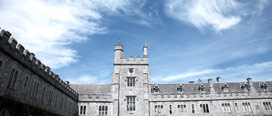UCC first Irish university to join consortium studying slavery

University College Cork has become the first Irish university to join an international research consortium investigating slavery.
Founded by the University of Virginia President’s Commission on Slavery and the University, Universities Studying Slavery (USS) encourages participating institutions to work together as they address historical and contemporary issues dealing with race and inequality in higher education.
Over the past decade, universities in the US including Georgetown, Brown, and Columbia have started investigating the historical role of slavery and imperialism at their institutions.
As the first university in Ireland and the third in Europe to join USS, UCC will leverage Ireland’s experience of and expertise in decolonisation to promote the decolonisation of higher education across Europe and to push African, Asian, and South American universities to get involved in USS.
Professor Patrick O’Shea, President of UCC, said it is entirely appropriate that the University join this “exciting initiative.”
“UCC was founded in 1845 and built from 1846-1849, during the height of the Irish Famine and on the heels of the historic six-week visit of esteemed abolitionist Frederick Douglass to Cork in the fall of 1845.
“We look forward to participating in the international discussion regarding slavery, colonisation, postcolonial politics, and issues regarding race and equality in higher education. Indeed, UCC is a pioneer in decolonisation with a rich history and deep archive that we, as an institution, are excited to share and leverage in the service of the core mission of USS.”
UCC will work in transatlantic partnership with USS in examining the “inescapable network of mutuality” that animates global histories of slavery and imperialism, emancipation and decolonisation.
The UCC chapter hopes to excavate local histories, ranging from solidarities to complexities and complicities: from better understanding the “famine relief programs” run on starvation labour when UCC was built (1846-49) to the Irish populations that benefitted from the spoils of slave labour.
UCC’s decolonisation of curricula stretches back to the first courses in Irish language, music, and traditions in the early twentieth century. Despite the unfinished challenges and uneven pace of decolonisation, today’s UCC research-led curriculum stresses the links between racism and education from the imperial to the global age and finds progressive indigenous solutions from the intellectual, anti-colonial heritage of Irish oral traditions that echoes loudly in today’s postcolonial performativities.
The University currently has research clusters, campus initiatives, and courses working on the intersections of social justice, migration, inclusion, citizenship, gender, health, and sustainability, many working through ISS21: The Institute for Social Sciences in the 21st Century and Centre for Global Development.
Indeed, UCC hosted this year’s National Famine Commemorations, welcoming the President of Ireland Michael D. Higgins for its launch of the Irish Famine Online project, which aims to engage local communities in telling their own stories as part of this scholarship.
UCC’s organising committee, who will promote the USS mission in Ireland and Europe, consists of Co-Chairs Karl Kitching, Director of Equality, Diversity, and Inclusion, and Tríona Ní Shíocháin, Lecturer in Irish Traditional Music; and J. Griffith Rollefson, Lecturer in Popular Music Studies.
For more on this story contact:
J. Griffith Rollefson, Lecturer in Popular Music Studies, UCC: 089 220 6263.
